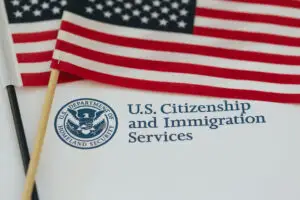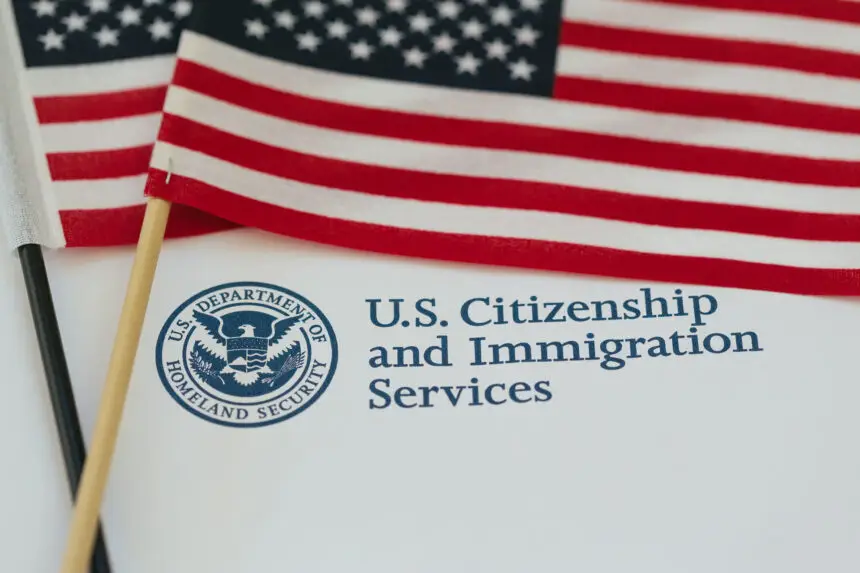U.S. Citizenship and Immigration Services (USCIS) will officially stop accepting checks and similar payment methods starting October 28.
From October 28, all fees for paper-filed forms must be paid electronically.
The agency says this move supports a broader federal digital payment initiative aimed at reducing delays and fraud associated with paper payments.
Applicants for immigration benefits — and authorized third-party payers — must now pay by credit or debit card using Form G-1450 (Authorization for Credit Card Transactions). Alternatively, they can use ACH bank withdrawals from a U.S. account with Form G-1650 (Authorization for ACH Transactions).
USCIS explained that this requirement eliminates the need to bring cash to field offices. It also complies with Executive Order 14247, titled “Modernizing Payments To and From America’s Bank Account,” which mandates a government-wide transition to electronic payments.
In a statement sent to media outlets, USCIS spokesperson Matthew Tragesser highlighted the administration’s direction: “Modernizing financial transactions between the federal government and the public is a priority for the Trump administration.”
He justified the reform by pointing to the high volume of paper-based payments and their operational impact: “More than 90% of our payments come from checks and money orders, which cause processing delays and increase the risk of fraud and lost payments. This is a common-sense measure.”
The agency clarified that online payments remain available for forms submitted digitally, as is already the case. USCIS also encourages applicants and accredited representatives to use their USCIS online accounts to file through guided processes or, when available, fillable PDF forms. Online filers receive detailed instructions for completing their applications and can pay securely through the pay.gov platform.
USCIS added that limited exemptions to the electronic payment requirement will still apply “in specific cases.” To request an exemption, applicants must submit Form G-1651 (Exemption for Paper Fee Payment), which explains the qualifying circumstances and the supporting documentation needed. USCIS will review the request and determine eligibility before accepting a non-electronic payment. Outside of these exceptions, any paper-filed application must include an electronic payment once the rule takes effect.
USCIS says eliminating checks streamlines processing and enhances transaction security. Local offices no longer handle physical funds, reducing fraud and administrative errors. Electronic payments also improve traceability and speed up case initiation.
For those who still prefer paper filing — often individuals working with third-party payers, community organizations, or those with limited internet access — USCIS stressed the need to plan ahead by gathering banking or card information, correctly completing Forms G-1450 or G-1650, and signing all required authorizations. The agency warned that any paper filing lacking a valid electronic payment will be rejected during initial processing.
USCIS said the policy aligns with the government’s digital transformation. The agency emphasized that more types of forms can be filed online. Online payment has become the default standard. USCIS highlighted the benefits of user accounts, including reminders, case tracking, and filing guidance, and encouraged applicants to submit electronically when possible.
The electronic payment mandate, however, raises practical concerns for some groups — notably unbanked households, individuals without U.S. bank accounts, and those who traditionally rely on money orders or third-party checks. USCIS responded that the system provides targeted exemptions through Form G-1651 and that applicants may rely on accredited representatives to securely manage payment procedures.
In its official statement, the agency explicitly linked this reform to the federal push for payment modernization, presenting the electronic transition as a new government standard. Citing current payment data, Tragesser reiterated: “More than 90% of our payments come from checks and money orders, which cause processing delays and increase the risk of fraud and lost payments.” He concluded by calling the reform “a common-sense decision.”
The measure applies to all applicants. This includes those filing petitions, renewals, and document requests, as well as authorized third-party payers. Legal representatives and accredited organizations must update their internal procedures. This includes gathering consent for card or bank payments, securing financial data, and verifying eligibility for online submission.
By the newsroom — Based on USCIS communications and spokesperson statements, October 28, 2025.








